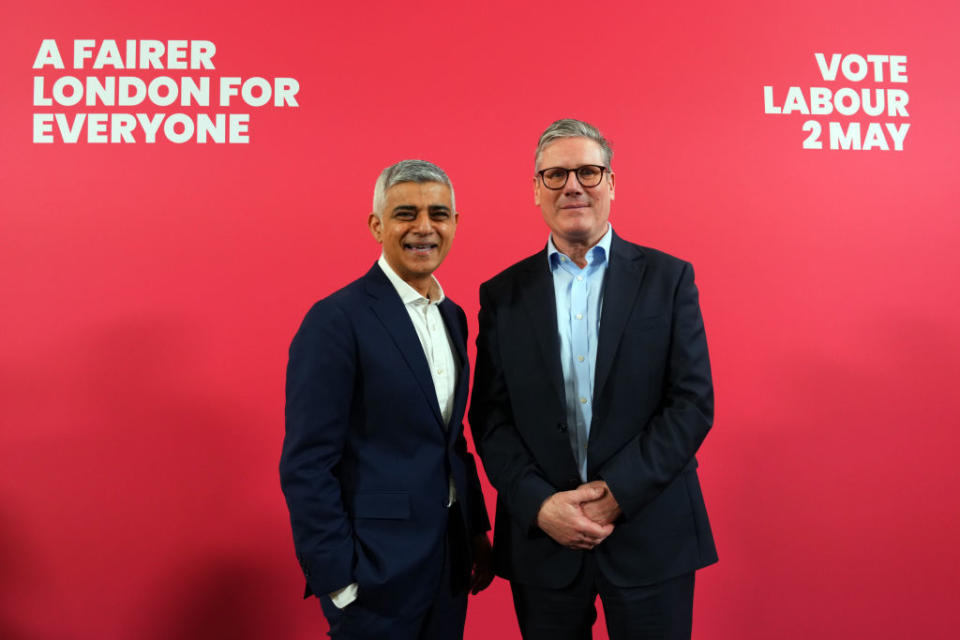Is Khan being left out of the Starmer project?

Labour could soon be in charge of Westminster and Whitehall, but a clash between Starmer and Khan risks stasis in London, writes Eliot Wilson
As the impending general election grinds inexorably closer, it can be easy, even for Londoners, to forget that the capital goes to the polls on 2 May to choose a new mayor. Even more than the general election, it is seen as a foregone conclusion: Sadiq Khan will inevitably win an unprecedented third term, hardly a challenging task in a left-leaning, Remain city.
The government tried to make his task harder. The Elections Act 2022 replaced the supplementary vote system used since 2000 with first-past-the-post, which theoretically could give a strong Conservative candidate an opportunity for a knock-out blow rather than left-wing non-Labour voters giving Khan their second preferences. In 2021, Shaun Bailey, a rather two-dimensional London Assembly member who had failed to be elected to the House of Commons in 2010 and 2017, came within 120,000 votes of Khan in the first round.
Last year, there was some traction for Conservative candidate Daniel Korski, a Danish-born tech entrepreneur who had a foreign affairs background before serving as deputy head of David Cameron’s Number 10 Policy Unit. In June 2023, however, Korski quit the race amid allegations of sexual misconduct, leaving the Conservative candidacy to London local government veteran Susan Hill. Her accident-prone campaign is assumed to be heading for defeat.
In a few months’ time, therefore, it is likely a Labour prime minister will be working at his desk seven miles away from a re-elected Labour mayor of London, who has comfortably the biggest individual electoral mandate in the United Kingdom. This surely presents a potential synergy, to use Raymond Cattell’s exhausted jargon, an opportunity to reinvigorate London’s governance in partnership with Whitehall and try to make more effective our sclerotic and limp institutions.
There is a powerful lobby which believes the capital’s mayoralty should have more power. In December last year, the Greater London Authority Oversight Committee – of which Susan Hall is deputy chair – published a report entitled Devolution in London. This called for the devolution of a range of functions to the mayor and London councils including property tax, revaluations, vehicle excise duty, suburban rail and some climate mitigation measures. The mayor himself has drawn contrasts between his levers of control and those of his counterpart in New York, who controls money raised by property and sales taxes and revenues from income taxes.
Sir Keir Starmer has constitutional reform on his radar. He commissioned former Prime Minister Gordon Brown to examine the United Kingdom’s institutional framework, and the result was a 155-page analysis, ‘A New Britain: Renewing our democracy and rebuilding our economy’. The document recommends far-reaching devolution of power to towns and cities, moving 50,000 civil service jobs out of the capital and replacing the House of Lords with an Assembly of the Nations and Regions.
Brown’s report mentions London no fewer than 97 times, but almost all of these are laments that the economy is too dominated by London, that too much capital flows there, that it exercises a baleful centripetal effect on the UK’s economy. It contains not a single recommendation for further devolution of powers to the mayor, the GLA or London’s 32 borough councils.
Nor has Starmer’s relationship with Khan been close. The Labour leader urged the mayor last summer to reconsider the ULEZ emission control zone, fearing an electoral backlash, and Khan then went much further than party policy in October when he unequivocally called for a ceasefire in Gaza.
He has stressed the opportunities and the challenges: since his office was established, Labour has only been in charge in Westminster and City Hall for four years, from 2004 to 2008, during which time, he points out, the city won the 2012 Olympic Games and secured funding for Crossrail. But Khan also warned, “there are going to be occasions where we don’t agree”.
If Starmer feels London devolution doesn’t fit his “vibe”, or fears Khan’s personal profile and ambition, there could be politely sterile stasis in London. The capital is facing challenges to its economy, infrastructure, law and order and social fabric. But there are no signs of new tools to take on these issues or make significant changes. It could be a dreadful missed opportunity not only for London, but for the whole country.

 Yahoo Finance
Yahoo Finance 